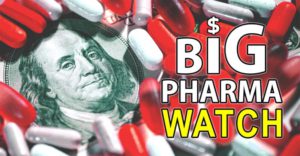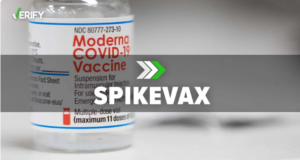Two Possible Bird Flu Vaccines Could Be Available Within Weeks, if Needed
NBC News reported:
The U.S. has two vaccines ready should the strain of bird flu circulating in dairy cows begin spreading easily to people, federal health officials said. They could begin shipping doses widely within weeks, if needed.

So far, there’s no evidence that H5N1 is spreading person-to-person, although one dairy worker in Texas who worked closely with infected cattle had a mild infection and developed conjunctivitis, or pinkeye, in April.
At a recent briefing, government health officials said they are preparing for a potential scenario of H5N1 jumping from animal to person — or person to person. The virus has taken off in dairy cows, infecting at least 36 herds across nine states, raising concerns that it could acquire mutations that would make it easier to spill over into humans.
Both of the vaccine candidates are already in the nation’s stockpile in limited quantities, officials said in a previous interview.
The Centers for Disease Control and Prevention also said that it is testing blood samples from people previously vaccinated with an influenza vaccine to see if it generates an immune response, although it didn’t say which vaccine.
Thousands Believe Covid Vaccines Harmed Them. Is Anyone Listening?
The New York Times reported:
Within minutes of getting the Johnson & Johnson covid vaccine, Michelle Zimmerman felt pain racing from her left arm up to her ear and down to her fingertips. Within days, she was unbearably sensitive to light and struggled to remember simple facts.
She was 37, with a Ph.D. in neuroscience, and until then could ride her bicycle 20 miles, teach a dance class and give a lecture on advanced science, all on the same day. Now, more than three years later, she lives with her parents. Eventually diagnosed with brain damage, she cannot work, drive or even stand for long periods of time.
Dr. Zimmerman’s account is among the more harrowing, but thousands of Americans believe they suffered serious side effects following covid vaccination. As of April, just over 13,000 vaccine-injury compensation claims have been filed with the federal government — but to little avail. Only 19% have been reviewed. Only 47 of those were deemed eligible for compensation, and only 12 have been paid out, at an average of about $3,600.
Some scientists fear that patients with real injuries are being denied help and believe that more needs to be done to clarify the possible risks. “At least long covid has been somewhat recognized,” said Akiko Iwasaki, an immunologist and vaccine expert at Yale University. But people who say they have post-vaccination injuries are “just completely ignored and dismissed and gaslighted,” she added.
AstraZeneca ‘Wriggling Off the Hook’ as Some Families Drop Out of Legal Action Over Costs
The Telegraph reported:
Families whose loved ones died after taking the AstraZeneca covid vaccine have abandoned attempts to sue the pharmaceutical giant after being told that they were likely to lose.
Gareth Eve and other families whose relatives were harmed after having the jab have pulled out of the High Court case after being told that they would be unlikely to succeed with their claims because a leaflet issued at the height of the pandemic warned of a rare side effect associated with the vaccine.
The document, given out at vaccination centers, said that “extremely rare cases of blood clots with low levels of platelets have been observed following vaccination with covid-19 vaccine AstraZeneca.”
Legal experts believe that this could potentially protect the pharmaceutical firm against cases brought by families whose relatives were given a dose supplied after April 7, 2021. In total, 12 families have now dropped out of the legal action.
More than 50 are still suing the pharmaceutical giant in the High Court, however, because their vaccines were supplied before the warning about blood clots was added to the patient safety leaflets.
Moderna’s Sales From Its Only Product, the Covid Vaccine, Fell 91% From Last Year
Fortune reported:
The dark days of the pandemic are finally in the past for most of us — and that seems to be reflected in the earnings for Moderna, whose revenue is dependent on sales of its covid-19 vaccine.
In the first quarter of the year, Moderna reported $167 million in sales of its only product on the market, its covid vaccine called Spikevax. The company’s first-quarter revenue is down 91% from the $1.9 billion it reported in the same quarter last year.

The plummeting revenue makes sense, considering the demand for the vaccine has been dropping since 2021, but it’s not all bad news for the vaccine maker: Its revenue surpassed Wall Street’s expectation of $97.5 million, and in turn, shares of Moderna jumped 7% recently.
Near the end of April, the company also announced a new innovation to integrate AI and ChatGPT in its operations as part of an ongoing partnership with OpenAI since 2023, according to OpenAI’s press release, and also has plans to roll out a new RSV vaccine this fall.
GSK Knew About Zantac Cancer Risk, Attorneys Tell Jury in First Trial
Reuters reported:
U.S. attorneys for a woman who claims her colon cancer was caused by the now discontinued heartburn drug Zantac recently told a jury in Chicago that pharmaceutical companies GSK and Boehringer Ingelheim knew the product could cause cancer if it was not handled properly but failed to warn the public.
Mikal Watts, who is representing 89-year-old Angela Valadez, said the companies knew that Zantac’s active ingredient, ranitidine, would turn into a cancer-causing substance called NDMA as it aged or was exposed to extreme temperatures, but did not ensure it was properly handled by transporters, distributors and stores.
Valadez’s case is one of tens of thousands against GSK, Boehringer Ingelheim and other pharmaceutical companies, which have worried investors in recent years. It will offer the first test of whether the cancer claims in the long-running litigation will persuade a jury, since all cases previously set for trial settled or were dropped.
GSK and Boehringer Ingelheim are the only defendants in the trial after other companies settled.
University of Minnesota Strengthens Case to Treat Covid With Metformin, Not Ivermectin
StarTribune reported:
Patients with covid-19 had lower viral loads if treated with metformin, according to new University of Minnesota research that argues for broader use of the cheap anti-diabetes drug and against the controversial use of ivermectin.
Recently published findings helped connect the dots and explain why metformin in a U-led clinical trial reduced the likelihood of covid-related hospitalizations or the development of long covid illness. The amount of virus in patients is often associated with the severity of illnesses and complications, and it was found to be almost fourfold lower in patients in the trial who took metformin vs. non-medicating placebo pills.
The results “could be a tipping point” that convinces doctors to prescribe metformin to treat covid, said Dr. Carolyn Bramante, the lead U researcher of the drug trial. “But people are cautious about using repurposed meds” so she predicted many will wait for results of a larger federally funded drug trial called ACTIV-6.
The U study results also showed that metformin users were less likely to see a rebound in 10 days of their viral loads, which also can be a proxy for the development of post-covid complications, or long covid.
Novo Nordisk Trims Price for Blockbuster Obesity Drug as Competition Heats Up
Reuters reported:
Novo Nordisk (NOVOb.CO) raised its 2024 outlook as the Danish drugmaker races to boost output of its Wegovy weight-loss treatment, while competition from rival Eli Lilly forced the company to cut prices of the drug, knocking its shares.

These are Novo’s second set of results since Lilly launched the obesity drug Zepbound in the United States in December and highlight the fast-changing dynamics as the two companies go head to head in a market that analysts estimate could be worth as much as $100 billion by the end of the decade.
Prices for Wegovy and diabetes treatment Ozempic, which contains the same active ingredient, fell in the first quarter amid increased volumes and competition, the company’s chief financial officer Karsten Munk Knudsen told analysts on a call.
“Given increasing volume and competition, net pricing like-for-like will be down in the U.S.”, he said, adding that the trend would continue through the rest of the year.
MRNA Vaccine Fights Deadly Brain Tumor in Small Trial
U.S. News & World Report reported:
An experimental cancer vaccine can quickly reprogram a person’s immune system to attack glioblastoma, the most aggressive and lethal form of brain cancer, a small, preliminary study has found.
The cancer vaccine is based on mRNA technology similar to that used in covid vaccines, but in this case, a patient’s own tumor cells are used to create a personalized vaccine, researchers said. The vaccine teaches the immune system to see tumor cells as a dangerous virus, prompting a vigorous immune response against the cancer, researchers said.
In a first-ever human clinical trial with four adult patients, the vaccine prompted a quick and apparently effective immune attack on cancer. The results mirror those seen in 10 pet dogs with brain tumors who served as early test subjects, as well as lab mice. Dogs offer a natural opportunity to test brain cancer therapies because they’re the only other species that regularly develop brain tumors, the researchers explained.
The vaccine now will be tested in a phase 1 pediatric clinical trial for brain cancer, researchers said.
A New Form of Mpox That May Spread More Easily Found in Congo’s Biggest Outbreak
Associated Press reported:
Congo is struggling to contain its biggest mpox outbreak, and scientists say a new form of the disease detected in a mining town might more easily spread among people.
Since January, Congo has reported more than 4,500 suspected mpox cases and nearly 300 deaths, numbers that have roughly tripled from the same period last year, according to the World Health Organization. Congo recently declared the outbreak across the country a health emergency.
An analysis of patients hospitalized between October and January in Kamituga, eastern Congo, suggests recent genetic mutations in mpox are the result of its continued transmission in humans; it’s happening in a town where people have little contact with the wild animals thought to naturally carry the disease.
Moderna Takes a ‘Break’ With New Virtual Communication Networks Series Spotlighting Scientists
Fierce Pharma reported:
Moderna has launched a new video series to energize its virtual communication networks followers’ midafternoon breaks.
Each instalment in the “Coffee Break Science” series will include an interview with one of Moderna’s scientists, who will “unpack a fascinating topic related to viruses, vaccines, or immunology” while grabbing a coffee, the pharma said in the caption of its first episode.
Moderna isn’t alone in kick-starting a campaign that highlights its scientists and has them explain their work in a relaxed setting. GSK previously launched its own “Science on the Sofa” series, in which the company’s experts were tapped to take a load off and chat about GSK’s work in treating various diseases.
Meanwhile, both AbbVie and Pfizer have recently put out corporate branding blasts focused on each company’s goal of making scientific breakthroughs — including AbbVie’s “The Case for Big Bets” campaign and Pfizer’s “Here’s to Science” ad, the latter of which aired at this year’s Super Bowl.
yogaesoteric
May 12, 2024
